After the enforced break due to the coronavirus pandemic, leading figures from the navy came together again for the first time at the Historical Tactical Conference. The fruitful dialogue between young and experienced officers was revived for the 62nd time.
It is the German Navy's annual event in January: the Historical Tactical Conference. But nobody in naval circles calls it that. It is the HiTaTa, which was held at the conference hotel in Linstow for the 62nd time since its premiere in 1957 after a two-year break due to the Covid-19 pandemic. Initiated by the then Commander of the Naval Forces, Rear Admiral Rolf Johannesson, in order to learn from history in an open and critical atmosphere, the format has continued to evolve. This myth-enshrouded conference serves to promote the exchange of professional opinions and networking.
The HiTaTa is an old naval tradition that is difficult to copy. Anyone who is not a naval officer or does not belong to the naval associations and supporters must stay outside. The press is also not permitted, after all, people speak their minds here, regardless of rank, age or position. The conference has certain rules that are not necessarily obvious to outsiders, but these include the fact that this is not a scientific congress, that decorum must be maintained and that humour is not prohibited. The HiTaTa also stipulates that while the speakers are to be applauded thunderously, their superiors are not to be applauded. Traditions, after all. What has remained the same over the years is the open and critical discussion of historical and current topics by the conference participants. As a rule, the rank of the speakers and contributors takes a back seat to the quality of the presentations.
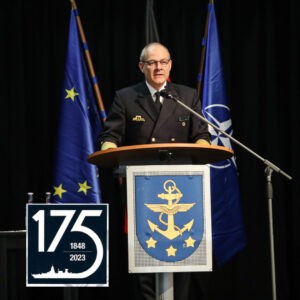
"The Navy does not report bare", says Vice Admiral Kaack, photos: Bw/Nico Theska
This year's main theme "Changing times and upheavals - 175 years of German navies" was not intended as a self-praising birthday present either, as Vice Admiral Frank Lenski, who was present for the first time as commander of the fleet, had not only "brought the conference out of quarantine", as he put it, but also provided the 550 participants with a further development that could also be interpreted between the lines of his closing speech as "no more like this".
Turning point and mindset
But from the beginning: it is also a good tradition that a guest speaker is invited. After all, the Navy was even able to attract German President Frank-Walter Steinmeier in 2019. This time, it was Tobias Lindner, Minister of State at the Federal Foreign Office, who thanked the naval personnel for their "important service". He emphasised the increased importance of the northern flank for the security of Germany and its partners as a result of the Russian war of aggression against Ukraine. The turning point that has occurred requires a change in mindset in politics and the armed forces. Tobias Lindner admitted to having worn a uniform other than navy blue, a remark that was met with friendly laughter from the audience. The fact that a politician also acknowledges the Bundeswehr in this way is always a good thing, and not only in naval circles. And so his speech was always formulated in a friendly manner, especially his references from the day-to-day work of the Federal Foreign Office to the importance of the navy for the diplomatic service. Ship visits in particular are very welcome, as he expressly pointed out in connection with the deployment of the frigate Bayern to the Indo-Pacific region.
Unlike in the past, when the Inspector of the Navy, as a guest of the HiTaTa, formulated his leadership thoughts for the year at the end, Vice Admiral Jan Christian Kaack spoke on the first day. After his words of thanks, he got straight to the point: "Naval forces are one of the most flexible instruments of politics, setting political priorities with little effort, maximum attention and usually in a sovereignty-free area." The demonstration of naval forces is a friendly gesture for value partners, but also a signal to potential opponents, said Kaack, alluding to how the Navy had reacted to historic events twice within a very short space of time last year: on 24 February, the day of Russia's attack on Ukraine, and on 26 September, when the two Nord Stream pipelines were destroyed.
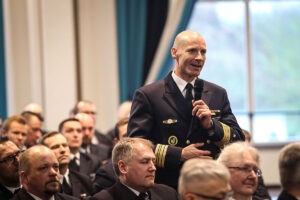
Debate with frigate captain Norman Bronsch, photo: Bw/Nico Theska
He outlined the tasks and challenges that the navy would be preparing for with a target vision for 2035. The navy "does not report blank", the people in the navy have a "can-do mentality" and with the turnaround, Chancellor Olaf Scholz has spoken from the soul of us all and thus brought the topic of security more strongly into society, said Kaack. He also spoke of an abrupt change in mentality that must now take place. He derived three things from this: "Back to the future, the new old role of the navy, secondly, recognising and using the opportunities of the new era and thirdly, human resources." He looked at the two potential new NATO partners in the northern flank area, assessed the increasing strength of the Russian Navy, the new priorities of the American naval forces and formulated the role of the "German Navy", which must be subordinate to national and alliance defence, as "regionally routed and globally committed".
The navy has been warning of possible attacks on maritime infrastructure for years, and the attack on the Nord Stream pipelines proves the "massive impact this can have on our society". He was critical of the special fund and spoke of a "palliative measure" if it was not accompanied by an increase in the defence budget. Kaack expects an improvement in the availability of naval units through the acquisition of the Warnowwerft shipyard and its reorganisation into a naval arsenal. Looking ahead, the biggest challenge for the navy over the next three years will be recruiting and retaining personnel: "You have to have good people," said Kaack. He wanted the navy to be a "talent model" and called on those present to contribute their ideas for improving the navy and making it fit for the future.
The view of young officers
However, the core of the HiTaTa is always the presentations by the majority of younger officers. Lieutenant Captain Joachim Mrnka from Naval Air Wing 5 began the programme with a presentation on naval armaments that are in line with the war picture and therefore appropriate to the threat. Lieutenant-Captain Annika Klußmann-Bahnemann from the BAAINBw (Federal Office of Bundeswehr Equipment, Information Technology and In-Service Support) focussed on the interaction between tactical development and technical innovation. First Lieutenant Simon Baumgärtner from the Naval Operations School posed the question of the extent to which naval battles and wars of the past can be used as a basis for military action in the present and future. First Lieutenant Louise Kalz from the frigate Hessen presented problems of personnel recruitment and retention from the past and present. Lieutenant Captain Kai Stehrenberg, also from the Naval Operations School, discussed constants and breaks in the way tradition has been dealt with since the founding of the first German navy by the Paulskirchen parliament 175 years ago. Selected speeches will be published by marineforum in future issues.
The HiTaTa also has a tradition of celebrating a social evening, which is dedicated to networking over a good meal. The evening was accompanied by the Kiel Naval Music Corps, led for the first time by Lieutenant Captain Inga Hilsberg. A new sound in the navy: Abba instead of marches, a symbol for the future?
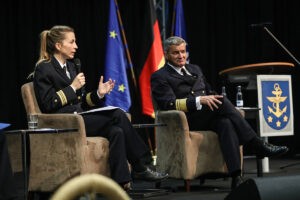
Lieutenant Captain Annika Klußmann-Bahnemann during the debate, photo: Bw/Nico Theska
In any case, the commander of the fleet, Vice Admiral Lenski, addressed the topic of marching music and how to deal with it in the future in his summary. He began by thanking the speakers for their presentations and "for having the courage to come here". He cited the current references and went into some aspects of the presentations. He quoted the fact that the "greatest danger lies in the moment of victory", referring to the mistakes of the reductions of the past decades. It is important to be able to act and to question old processes and "concentrate on core processes".
He also saw significant parallels to the past when it came to recruiting staff and said that we had to learn to deal with the motivation of younger generations. He mentioned dealing with tradition and explained the importance of "how we lead, how we lead by example. Good leadership as tradition, I can't think of anything better." He also called for more effort to be put into history with regard to the HiTaTa and expressed the fear that naval historians are dying out, even though they are indispensable. He summarised the work of the navy in the past year with the words: "We have achieved a great result, exemplary, prompt and professional."
With a view to the turning point, however, he also mentioned the deficits. These are known, he said, and now we have to deal with them. The fleet and its operational readiness are an absolute priority for him. He indicated that the paths taken would be reviewed on the basis of several aspects.
Traditionally, the first row of seats is occupied by the predecessors of the naval leadership. It is therefore not clear to those in the back rows whether their faces lightened up during the speeches and the commander's closing address.
Both the selection of presentations and the form of the HiTaTa showed a willingness to evolve, and not just because of last year's events. This is also a tradition, and it is rumoured that there will be moderate changes next year, starting with the participants. According to its founder, HiTaTa is an event organised by the fleet for the fleet, and it should be young.
Holger Schlüter
In a previous version, it was incorrectly stated that Lieutenant Captain Annika Klußmann-Bahnemann was from the BAIUDBw. This is incorrect, she works in the BAAINBw (Federal Office of Bundeswehr Equipment, Information Technology and In-Service Support). She is a member of the submarine group in the Sea Division. Please check the error.


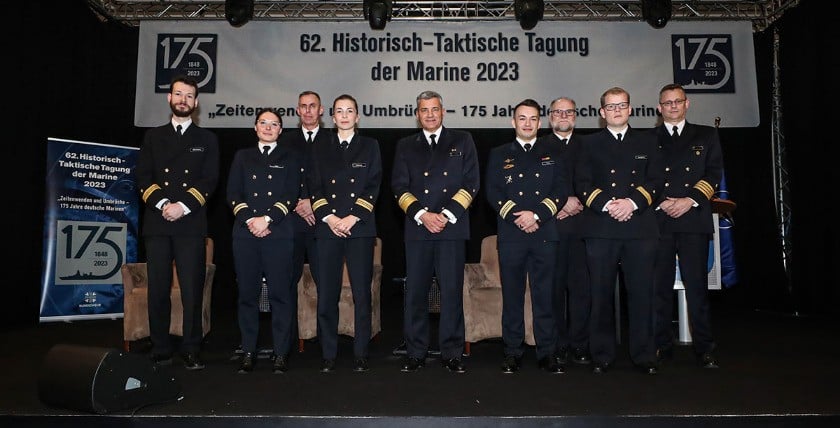






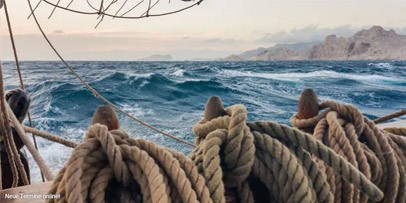


0 Kommentare